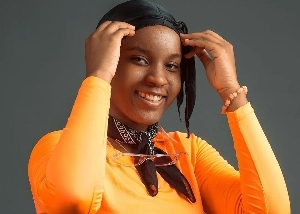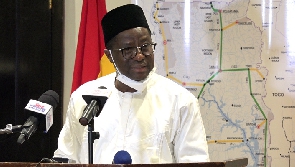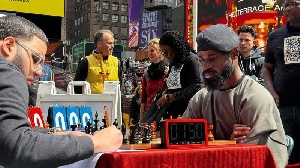Opinions of Tuesday, 2 August 2011
Columnist: Tawiah-Benjamin, Kwesi
Holiday Report: I was in Ghana And I Fell in Love
You don’t say ‘I do’ lightly. And in our part of the Jordan, you say I do to an entire family, not just the frenemy (friend and enemy) in front of you. There is often not a chance to pause for reflection at this stage. So when it was my turn to speak, I couldn’t look Ghana in the eye and say I do not. I do love my country, the politicians and all, including those who make nation building seem only a little difficult than an expensive joke. Just that the jokes I heard in Ghana between June and July were quite inexpensive. Even so, there were a few moments when I couldn’t help but let myself go, and lose my senses in the sheer wonder of everything Ghanaian. And I have owed to these moments.
First, I genuinely fell in love with a Daily Graphic columnist called Meri Nana Ama Danquah. She writes with extraordinary flair, and her words come as naturally as the way leaves come to a tree. She takes subject matter seriously, because the subjects seem to matter to her. I still love good old George, and frankly he remains my inspiration, but this American-trained writer is a bit of a new catch, (but she is Ghanaian through and through), so I would love to negotiate my love affair past my old friend and say ‘I do’ to my new sweetheart. And that is in keeping with the quintessential Ghanaian character: There necessarily ought to be something awesome in anything new. Yet, the Ghanaian does not want it completely new; the new thing must fit into the ordinary idea of what is also familiar. Otherwise, it is an ideal that cannot support the ordinary idea.
I didn’t exactly fall in love with the mass scale accreditation for private universities. I could count about five universities in Dansoman alone, including Sikkim Manipal University, a private venture housed in a strip mall at Dansoman Sahara. I had written about the accreditation bonanza in my sugar daddy article, in which I expressed some worry at the development that has seen some secretarial institutions graduate to universities overnight. I had also chanced on a highly placed official in the education sector who had explained that the mass accreditations were actually a response to government directive on tertiary education. Well, government would not gamble with the future of a whole generation when it is in the know that technical knowledge from polytechnics is the way to go. And that is not because the World Bank said so.
Let’s consider a few examples from Canada and South Korea. In the Canadian capital of Ottawa, there are two main universities (Ottawa U and Carleton University, and St Paul’s, which is an affiliate of Ottawa U.) There are two main government-regulated community colleges (Algonquin and La Cite Collegiate, whose curricula are mostly instructed in French.) There are not more than five other private colleges besides these. Yet, Ottawa has the highest concentration of degree-educated and white collar-skilled human capital in probably the whole world. Even in the densely populated immigration capital of the world, Toronto, there are only about three or four main universities serving the city. There are also some good private institutions.
In the case of South Korea, there are about 180 universities (530 including polytechnics and colleges), very few of which are government owned. A PhD is not exactly a fantastic achievement in that important Asian country. With too many degrees on the market, the 50 million population have to slug it out and compete for the few jobs available. My Korean friend next door calls it education inflation. And with the nearly 2000 Korean PhDs from the Americas, it is feared they would add to the numbers, as most of them contemplate a career in their home country where salaries are greater than what they receive as post doctorate research fellows. Ours is a much more complex affair.
While in Ghana, I had also fallen in love with the sheer spending power of the average Ghanaian. 20 Ghana, as that denomination of the new currency is generally called, cannot do half of the things that $20 would accomplish here in Canada.10 Ghana to top up the units on your phone, 50 Ghana for gas (we call it petrol), 10 Ghana for Mawuli Banku, 2 Ghana for Voltic water, and you are almost done. But the day is not quite done yet. Folks have time to meet up for Akonfem khebab and beer after which they drive to their own houses (not mortgages) in their sleek, pricy 4/4 automobiles, making my hire-purchase car in Ottawa look more like a stolen item. But hire-purchase deals in Accra are looked down on, such that young women are eager to mark down a suitor who drives a car procured on hire-purchase, especially if the vehicle is new. And it doesn’t matter if they (the girls) don’t have any themselves. Men must necessarily measure up, it is believed.
My next love affair was with a celebrated lawyer who had threatened to sue the government of the day for tolerating the old, dehumanising head-pan latrine practice, where sane Ghanaian men carry human waste on their heads for disposal. I asked him why he didn’t sue the previous governments that bore with the same practice for 40 years. He had found it impossible to reconcile the practice with the country’s newly elevated status as a lower middle income economy. But then, what is compatible with our new enviable middle income status? There are thousands of children playing the idiot’s advocate with their otherwise promising future, by taking lessons under trees and bearing with the horror of watching their potential spirit away in their country of birth. Is that not worse that carrying human waste on a greying adult head? What about children of school going age who ply a very dangerous trade on the principal streets of the capital, navigating their future through traffic and risking the terrible driving, just to earn a little living on pitiful sales from chewing gum and apples? A bloke chased us with yams and begged us to ‘give him reason to live for the day’ by buying a tuber. Another, a boy of seven, or less, looked intently into our eyes and yawned away the last surviving feeling of hope for life, lifting up lemons for sale: “Dada, all these for 1Ghana”.
That is if anybody would buy those poor lemons off his tired head. He had carried the burden of the lemons for some eight hours without any sales. Would anybody buy this boy’s life for 1Ghana, so he can take a rest? I asked Sarfo to park, whereupon we invited the lad for what he thought was a lifetime opportunity to make a sale. I may not need lemons but the lad could do with some money from me. But how much do I offer him? There, I started thinking like a politician, finding it so difficult to negotiate a good future for a poor boy while making sure I have more than I would ever need for myself and family. I was going to give him 20 Ghana so he could go take a rest, but I had run out of local currency. Is $20 too much for a poor boy? Or even $50 or $100? Could I offer to sponsor his education and provide for him, as Mr James Wilberforce, a friend’s dad, has done for some vulnerable homeless children? At the last count, he was sponsoring 12 children. He has rented apartments for them and provides food, pocket money and occasionally money to travel to visit their parents. A popular media baron in Ghana has singlehandedly sponsored hundreds of children, some to university level, and also employs thousands to work for his group of companies. I asked Sarfo, my driver, to find something for the boy. 5 Ghana was all he could conjure. As it is his custom, he saw no need at all for that gesture. With 5 Ghana, I had mortgaged away my right to criticise any politician for failing to solve the innumerable problems of this country.
Just as we made our way back into the snail-paced traffic, my cell rang. Sonnet, my daughter, had completed her piano lessons for the day and wanted to play me what she had learnt. ‘Oh happy day, when Jesus washed my sins away’ was the song of the day. She played it beautifully. But the irony of that song reminded me of the greedy bastard in my very person. My daughter in Canada has the luxury of learning how to play the piano while her contemporary in Ghana is plying a trade in traffic, selling sun-scorched and morose-looking lemons for a living. Sonnet gets swimming lessons and has so far enjoyed two holidays in Disneyland. The lemon seller does not have the luxury of even imagining what Disneyland would look like. Yet, they are going to compete for the same resources and opportunities the world has to offer, even if they live worlds apart.
Anyhow the contrast is biting. The rich in Ghana are comfortable enough to afford a world of luxuries for their children. Nearly all my friends take their kids to swimming lessons and holidays abroad. These kids were usually conceived in Ghana but their mothers had travelled abroad in the twilight of their pregnancies, to ensure they were not born Ghanaians. The parents, however, are proud to be Ghanaians while their children are either British or Americans. They are called designer babies. There is another category of designer babies called double-double. These are children made from IVF conceptions prepared in Teshie in Accra, and delivered abroad. Others have also called them lucky sperms, because the artificial process of conception is the kind that makes sure only the healthiest sperms are used, so the babies are usually good-looking, or at least healthy. And these are not children of politicians; the well placed, upper middle class Ghanaian earns enough to afford these luxuries, build a mansion or two and sponsor himself and his wife through MBA programmes at GIMPA. Some have in addition, signed up to professional courses abroad, which oblige them to attend lectures once a month in London or the United States of America. Ghana is not as poor as we think.
Ghana loves me, Ghana loves Me Not. This was supposed to be the title of this holiday report. For, I had seen an Uncle Ebo Whyte play, ‘He Loves Me, He Loves Me Not,’ and understood the dilemmas that shape our thoughts and define our very humanity. I came home with a conscience full of catharsis. I had fallen in love with the script and the delicious acting of Rastafarian angels and alcoholic mums. The tripartite personality of a young girl in love had given me reason to search and appreciate the good things in the people around me, that little good thing in everybody. So I have learnt to appreciate the many good things in Ghana, even if they are not good enough. Then, when all was set for me to return to Canada, I fell in love all over again with somebody. There, I felt like calling Uncle Whyte to advise him to reword the title of his play, and chop away the part that says ‘He Loves Me Not.’ It gets lovelier by the day–Love, that is.
Kwesi Tawiah-Benjamin
Ottawa, Canada bigfrontiers@ymail.com
Entertainment











